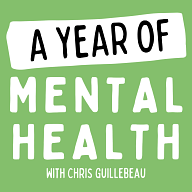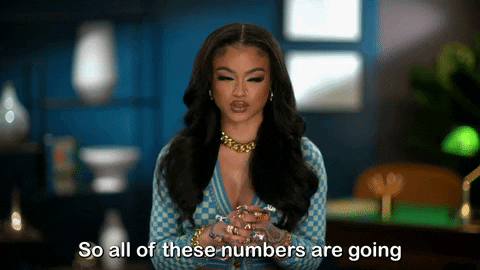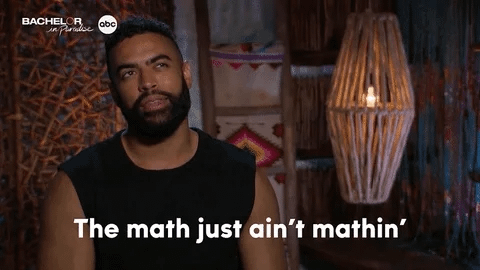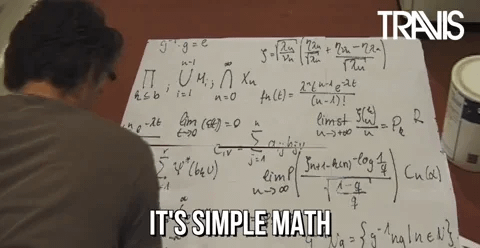Thanks for reading A Year of Mental Health! If you're enjoying it, consider supporting the project by upgrading your subscription. This grants you access to bonus tools and resources, including a special audio version of this post. 🎧 If You Can't Learn Math, Maybe It's Not Your FaultA condition called dyscalculia makes it difficult to understand and work with numbers.🎧 This post is also available in an audio version for paid subscribers. Click the play button below for a sneak peek of the recording. “If you can't learn math, maybe it's not your fault.”That’s the title of a post I wrote several years ago, mostly on a whim after reading a book about catching a spy. To my surprise, it became one of my top-ten posts of all time. (Bonus side lesson for creators: it’s usually a good idea to make lots of different things. You can’t always predict what will take off and what won’t.) Since it’s been a while, I thought I’d share the post here in the new newsletter. This might be especially relevant to anyone who’s struggled with math, anyone with a learning disability, or anyone who’s felt misunderstood in some important way. Here’s the original post, lightly cleaned up for a new home several years later. ⬇️ ⬇️ ⬇️ My experience in higher education was unusual and erratic. I eventually earned a master’s degree, but first I was a high-school dropout.One thing I haven’t talked about much is that I’ve never been able to learn higher math: algebra, geometry, calculus, or anything of the sort. It’s not for lack of trying, or at least it wasn’t for a while. (I have zero interest in trying to learn it these days.) No, I tried and I just couldn’t learn. I tried over and over and it never got any easier. In the U.S. educational system, I failed to progress beyond seventh or eighth grade level math. I’m not sure what the equivalent is elsewhere, but for me I could understand the very elementary principles of algebra and geometry but nothing beyond that. Lots of people tried to help. I read books and went to study groups. But no matter what I did, it didn’t sink in. Granted, some of my high school years were spent burning down houses and avoiding any sort of higher learning, so let’s fast forward a bit. We now reach the point of the story where I’m trying to graduate from university.I had snuck into the system through community college, and I had all the classes I needed except the basic math requirement. My degree was in sociology, which thankfully didn’t require much in the way of advanced math, but it did require something. In my last quarter before graduation I went to a community college to take that very simple math class. Most of my fellow students met the profile of people who didn’t qualify for or couldn’t afford other schools. They were overworked, often with multiple part-time jobs, and many of them were young parents with no easy access to childcare. In other words, despite my juvenile delinquent status, I was relatively privileged. At that point I also had some social skills and the beginnings of leadership ability, so I put that forward as my only strength. I asked questions in class and generally tried to show I was paying attention. When we had to do group work, I organized and spoke for my group. Still, this strategy kept me at the front of the pack for only two weeks. Once we started learning anything besides extremely remedial math, I fell behind. I could organize a study session and bring coffee for my fellow group members, but there was no hiding the fact that I was the one in need of tutoring. The car mechanic and the single mom tried to explain basic formulas to me. I pretended to understand because it felt embarrassing to be so clueless. This being community college, it’s hard to fail as long as you put in an effort, and I certainly did that much. I don’t remember my grade, but if it was anything higher than a C, I’m sure I didn’t deserve it. This theme continued a year later, when I was in grad school and had to take a statistics class. Here’s how I described the experience in an earlier post about my qualifications:
On the day of the final exam I looked at the paper and understood almost none of the questions. I wrote gibberish on the front side and drew an arrow to indicate something on the reverse side. On that side I composed a list of “Top 10 Things I Learned During Statistics Class.” I made sure a few of them actually related to assigned materials, even if I didn’t understand them. I somehow received a B- and placed a thank-you gift of coffee beans outside the professor’s door. Then I dropped out of the program and eventually went to be an aid worker in Africa for several years, but that’s another story. Why do I tell you all of this? If you’re still reading, I assume it’s either out of amusement or because you too struggle with math. I recently read a book, The Spy Who Couldn’t Spell, that tells the story of an American spy. The spy, Brian Regan, was both ingenious and inept. He had a Top Secret clearance and had buried thousands of pages of classified intelligence in Tupperware containers throughout the woods of Maryland and Virginia, all in a failed attempt to extract millions of dollars in payments from foreign governments. I’ll spare you the whole story (it’s a great book!) but one part of solving the crime relies on a government expert, Daniel Olson, who is called in to help crack the many codes that Regan had set up to protect his espionage from being discovered. And here’s where it gets interesting—not the espionage story itself, but how it relates to our story here:
When I read that passage, my attention perked up and I highlighted it on my Kindle. Fast forward a bit, and a senior leader notices Olson’s abilities. He’s recruited for a high-level job in Washington, working on important missions that would eventually lead to his being part of catching a spy. There’s just one problem: he’d never finished his bachelor’s degree:
When I read that, it sounded very similar to my story—well, except for the part about needing the degree for a job, and except for me being a genius who cracks codes. These days, most of us understand that there is more than one form of intelligence. In fact, there are many:
Still, most of us could also observe that some forms of intelligence are valued more highly than others in modern times. As noted, the condition that Olson may have had is called dyscalculia, and Wikipedia describes it as follows:
I added the emphasis above. Obviously someone who is a master cryptographer with skills exceeding those of many other highly qualified people is very likely to have high intelligence. Yet this person, and presumably many others, also have this condition that makes mastering math difficult. I emphasized the last sentence about ADHD because this is another condition that now receives more attention than it used to, especially among adults. Longtime readers know that I’m diagnosed with ADHD. A few years ago I started taking Adderall, which changed my life. Now, before people complain—well, some will complain anyway, but that’s okay—I’m not diagnosing myself with dyscalculia. I also can’t diagnose you with dyscalculia, ADHD, or anything else. All I know is that no matter what I did, I could never learn higher math. It wasn’t the teacher. It wasn’t lack of ambition or neglect of study time. And presumably it wasn’t due to general developmental delays, since I’ve managed to do a few other things despite this handicap. I felt comforted to read this real-world example of someone much smarter than me who experienced the same difficulty. If you couldn’t learn math either (or if you’re reading this now and you can’t learn math), maybe it’s not your fault. Instead of trying to overcome it, you can also look for a way around it. You can focus on other intelligences, especially the ones you’re particularly gifted in. Then, perhaps, you’ll find your true genius. Back to Present TimeThat’s the post I wrote seven years ago, mostly on a whim after enjoying the story about the spy-catcher. Learning that “dyscalculia was a thing” was an unexpected bonus! In the years since I’ve gotten lots of emails, mostly from people who recognize parts of themselves in the story. I’ve also heard from people who are convinced I wasn’t learning the right way and that if I only learned from them (or used their method, perhaps) then I wouldn’t have had this problem. Who knows, maybe they’re right! But I really don’t think so. Denying the existence of a learning disability is a lot like saying “try harder” to someone who’s struggling. You can always try harder, but you’ll probably be a lot better off if you first try to understand what’s really going on. Conversation Starters
See Also
1 One estimate is even higher: “Between 5% and 8% of school-age children have some form of memory or cognitive deficit that interferes with their ability to learn concepts or procedures in one or more mathematical domains.” From ‘Mathematics and Learning Disabilities’ in the Journal of Learning Disabilities You're currently a free subscriber to 🌻 A Year of Mental Health. For the full experience, upgrade your subscription. |
Wednesday, March 13, 2024
If You Can't Learn Math, Maybe It's Not Your Fault
Subscribe to:
Post Comments (Atom)
Our Latest Breakthrough – A Seasonality System for Growing Profits, Year After Year
We've cracked the code to identify the market's repeating cycles. And now we're putting that power in your hands. ...

-
insidecroydon posted: " Become a Patron! What's on inside Croydon: Click here for the latest events listing...









No comments:
Post a Comment